FOR FOLKS WITH SMALLER CRITTER TROUBLES
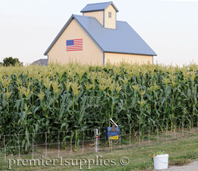 RaccoonNet™ 4/18/12
RaccoonNet™ 4/18/12
| • |
Simple to install/remove
|
| • |
Very effective
|
| • |
Easy to step over
|
Raccoons are notorious for their addiction to sweet corn and other garden produce. They can destroy months of work in a single night and always seem to do so about a week before it’s ready for human consumption. As sweet corn growers know, the best “raccoon-stopper” is an electric fence.
RaccoonNet is unique because it’s a complete electric fence in each roll. All line posts are built into each roll.
| • |
Just push the small posts into the soil by hand and hand-tension the net as you do so.
|
| • |
Use FiberTuff™ posts to support the net at curves, corners and ends.
|
| • |
Attach a suitable energizer and you have a reliable raccoon stopper.
|
PREMIER PICKS
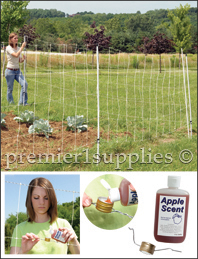
Protecting a garden with Deer QuikFence™ and scent caps baited
with apple scent. Make sure to bait the caps before the produce is ready, as this will teach deer that the area within the fence is off limits!
Scent Caps
Scent caps attach to electrified fence strands. When a deer touches its nose to the cap, it receives a strong shock. Bait with apple scent to attract deer to the scent cap.
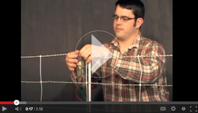
View our how-to install a BlitzLight video above.
BlitzLight™
Produces a bright "blue" spark. Visible more than 500 ft at night if located where there is no other light. Flashes with every pulse over 3000v (the opposite of the Volt Alarm). For energizers 0.5 joule or larger.
| • |
Hangs on an existing fence. Metal clamp ensures positive fence contact.
|
| • |
No battery needed. Gets its power from the pulse itself (which is why a larger energizer is necessary).
|
| • |
Works with most netting.
|
| • |
Very easy to use.
|
| • |
Visual reassurance that the fence is working.
|
Fence Fault Finder
3-in-1 tester for fence voltage, intensity of current and fault finder. Indicates which direction a fault (leak) in your fence is located.
GARDENING TOOLS
Garden Care Tips
By C. Colston Burrell
Like playing a lively game of tennis, keeping your garden looking great depends on having the right equipment, developing a good technique, and being organized enough to do the right things at the right time. This may sound like a lot to juggle, but once you understand the basics, it's easy.
For a start, you need good hoes, spades, rakes, pruners, and a sturdy wheelbarrow. Then you need to learn how to control weeds with cultivation and mulch. A few basic pruning cuts will help you rejuvenate and control the size of your shrubs and trees. Other helpful suggestions in this article will help you polish up the rest of the landscape.
Let's get started with suggestions on how to take care of garden tools.
| • |
Buy the best tools you can afford. There is no substitute for good tools. Tools that cost half the price but last only two years (instead of 22 years) are not cost-effective in the long run. They may also fail you in the middle of a big project, just when you need them most.
|
Read More »
Note: Check local ordinances before installing any electric fence.
|
 |
 |
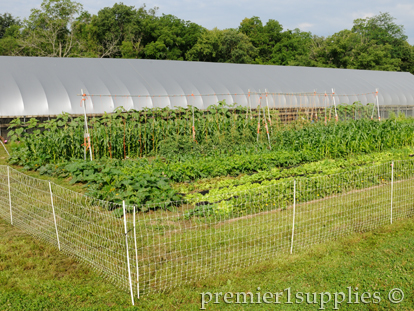
To keep deer, guard dogs and Premier's free-range ducks from disturbing the garden, Adrian installed PoultryNet™12/48/3 around it.
The magic of fresh vegetables
There has been controlled chaos in the Premier lunchroom of late. Adrian, the shepherd/gardener, has been bringing in coolers full of produce on a daily basis.
In each bundle are salad greens, cucumbers (affectionately called cukes), basil, radishes, broccoli, zucchini, peas (snap and non-snap) and parsley. Within the next week, spring onions will be added to the mix. Adrian is hopeful that we will have the first tomatoes next week, accompanied by early spuds (potatoes).
Folks enjoying the fresh produce are finding creative ways to incorporate the garden's bounty into their lunches. Some favorites have been pesto sauce, cucumbers with olive oil and cracked pepper, and tomatoes with mozzarella and avocado.

To follow Premier's gardening throughout the season, see our Newsletter Archives "Garden/Wildlife Newsletters"
|
VINEYARD USES 3-D FENCE
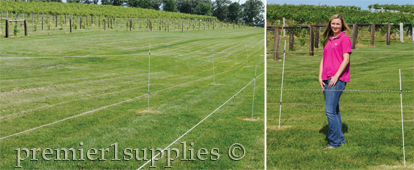
(photo at left) Fireside Winery's 13-acre vineyard guarded by Premier's 3-D anti-deer fence. It's baited during high-deer-traffic seasons to discourage the deer from enjoying the grapes and leaves. (photo at right) A 3-D fence has depth as well as length and width. When a fence has depth, deer experience landing anxiety. Being uncertain about where they will land if they jump the fence, the deer decide to find their food source elsewhere.
Fewer deer make for more wine!
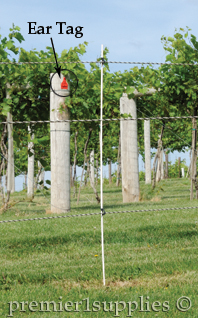
Aside from the fence, we noticed an innovative use for ear tags. Each row of grapes was labeled with a UV resistant ear tag to identify the type of grape in each row.
|
Want to grow wine grapes but have significant deer pressure? Build a 3-D anti-deer fence. Zach Bott of Marengo, Iowa, did just that for Fireside Winery's vineyard.
Bott, a longtime shepherd and Fireside's winemaker, needed a fence that could keep deer out of the 13-acre vineyard. He didn't want to put up a 6 ft+ woven fence and looked for alternatives. He contacted Premier and spoke with Stephanie Sexton, who visited the vineyard and then recommended a 3-D fence. (The 3-D fence is actually 2 fences of electrified rope set 3 ft apart. They combine to make a barrier that has height, width and depth!)
Bott baits the fence twice a year with scent caps, once in the spring when the leaves bud from the vines, and later in the summer when the grapes are ripening. These are the times when deer pressure is the highest, and Bott wants to ensure that the local deer know the vineyard is off limits.
The fence has been up and used consistently since 2009. Bott remarks that the fence "really keeps them (deer) out."
Plans are being made for expanding the vineyard and planting more grapes. Bott thinks they will experiment with a 2-D multistrand fence.

Iowa's largest wine bottle (13' 7") sits at Fireside Winery's entrance. The bottle weighs 1820 lbs and was crafted by local metal artist Randy Schnebbe of RS Welding Studio.
View our deer fence installation instructions:
See all of Premier's Deer Fence options.
|
DEER EXCLUSION OPTIONS
Deer QuikFence™ 5/60/12
Easy to use. So much so that it
surprises new users. The process is the same as for all other netting: unroll it, unfold it along the fenceline, hand-tension while inserting the posts, and energize. Extra support posts will be needed at curves, corners and ends.
Note: Deer, like goats, have high internal electrical resistance (thin legs, hollow hair, hard hooves).
So it works best to use a wide-impedance fence energizer—such as the Kube or IntelliShock units—that is specifically for high-resistance animals.
PermaNet® 19/68/3 and PermaNet® 12/68/6
An extra-tall version of netting for extreme situations.
These net designs are superior to all other electro-plastic fences for effectiveness against wildlife—but, because it is so tall and has so many strands (12 or 19), it requires more support posts than shorter nets.
Because it has so many energized wires so close to the soil and is intended to also stop “furry critters,” this net is likely to experience high weed contact. Therefore, an energizer with a high joule output is best.
|
TROUBLESHOOTING ELECTRIC FENCES
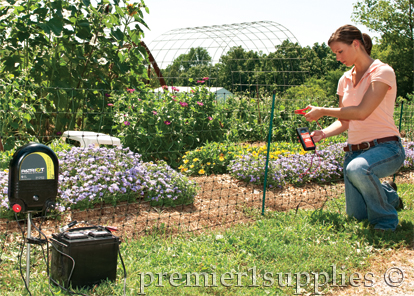
Test garden fences such as VersaNet® with a voltmeter to make sure they are adequately electrified. For out-of-the-way gardens, use battery or solar energizers.
Is it the energizer or the fence that's the problem?
To check, follow these steps:
| 1. |
Turn off the energizer.
|
| 2. |
Disconnect the wires going to the fence and ground rod system.
|
| 3. |
Turn the energizer back on.
|
| 4. |
Measure the voltage between the 2 terminals (fence and earth) on the energizer with a digital voltmeter or other fence testing device (place a probe onto the “-” terminal and a probe onto the “+” terminal).
|
| 5. |
If the tester reads less than 4000 volts, the energizer (or possibly the battery if it’s a battery energizer) is the problem.
|
| 6. |
If the tester reads more than 4000 volts, the fence is the problem and the energizer is working properly..
|
For more information, read Troubleshooting Electric Fences and Common Fencing Mistakes. Or contact one of our in-field fence consultants at 1-800-282-6631.
Customer Review - Digital Voltmeter
This voltmeter is easy to use and works very well. It's definitely not built as ruggedly as my Fluke multimeter and thermometer, but it doesn't cost $200 either. Handled with reasonable care, it should last just fine.
—Nathan K from Middle, TN
|
|